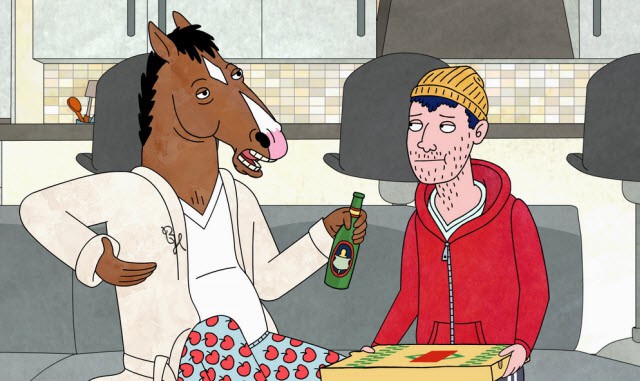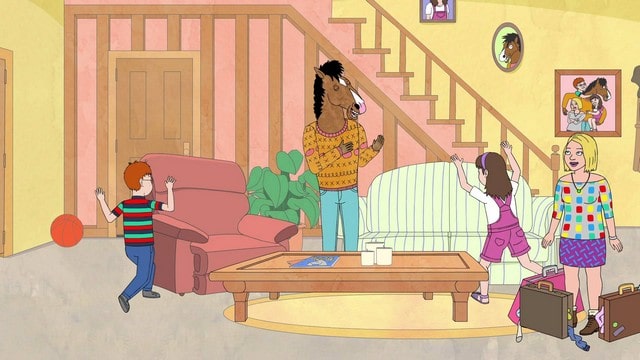
At first, BoJack Horseman is a fairly simplistic, consistently clever little satire of Hollywood superficiality, a familiar story told through the lens of the absurd world it was set in. BoJack, a former 1990s sitcom actor (on the long-running, thoroughly mediocre Horsin’ Around) and current washout, partied and philandered around his mansion and LA, consistently surrounded by reminders of who he once was; from “Chapter One” to the season’s seventh episode “Say Anything”, BoJack is a series of well-trodden stories about a horse-man’s mid-life crisis as he tries to explore the most successful (and darkest) periods of his life with the ghost writer of his memoir, Diane (a woman he’s slowly falling in love with, as well).
However, the last five episodes of BoJack‘s first season take a sharp left, abandoning most of the slapstick humor and silly, slightly vulgar B-plots for a very serious character study of a man undone by his success, a process that begins with the flashback events of the season’s eighth episode, “The Telescope.” In it, BoJack’s rise and fall is documented in one powerful half-hour: made famous by a fellow comic at a local club, BoJack’s arrogance fed his ego, driving a wedge between him and Herb Kazzaz, creator of Horsin’ Around. After BoJack chose between a possible movie career rather than supporting his friend (who was outed and ridiculed), Horsin’ Around was canceled and his dream Secretariat project disappeared, thus beginning BoJack’s downward spiral into self-loathing.
“The Telescope” puts the entire half-season before it into perspective: each of those first few episodes, BoJack’s essentially spiraling the drain, repeating the same cycle of self-deprecation in each half-hour, sabotaging any personal progress willingly through forced ignorance. Like his hero Secretariat says indirectly to him in the season finale’s opening flashback, BoJack is running – but instead of running forward, he’s just running away from the problems he’s created for himself over the years. He ruins his friendship with Todd (pushing him to become employee and best friend to Mr. Peanut Butter, his nemesis), pushes away Diane (who then marries Mr. Peanut Butter), and ends up starring as Mr. Peanut Butter in a romantic comedy, essentially about himself (In episode six, BoJack steals the Hollywood “D” and tries to give it to Diane, in the end giving the credit and story to Mr. Peanut Butter).
That downward spiral really kicks into gear in “The Telescope”, when BoJack goes to visit Herb to try and make amends for what happened in the past. Dying of cancer, Herb isn’t willing to hear BoJack’s self-serving apology; “When I needed a friend most, you abandoned me; you don’t get to have closure,” he tells BoJack, “You have to live with that for the rest of your life.” It’s an important lesson BoJack doesn’t begin to embrace until “Later”, the idea that until he can let go of what happened in the past, he’ll never be able to move on – and more importantly, he’ll never be a good person unless he deals with the disappointment he feels for doing so much wrong throughout his life.

Yet BoJack never forgets that important lesson the cancer-ridden Herb passes along to BoJack: despite seeking redemption in various places throughout the rest of the season, BoJack isn’t able to find it. Mr. Peanut Butter’s Hollywoo Heist falls apart (thanks a lot, Quentin Tarantulino), Todd becomes best friends with Mr. Peanut Butter, and Diane gets married to Mr. Peanut Butter, finishing her book about BoJack and naming it One Trick Pony.
Those events all lead to “Downer Ending”, one of the finest television episodes of 2014: in it, a drugged-out BoJack experiences a series of hallucinations, a psychedelic experience that ends with BoJack exploring an alternate reality where he married Charlotte and moved to Maine, a woman he’d left behind years ago when he became famous. It’s the ending to One Trick Pony he desperately wants to write – but it wasn’t the choice he made, and the beautiful Charlotte will always remain an unattainable fantasy for him. And it causes him to question the very nature of who he is: the episode ends on a cliffhanger, with BoJack desperately begging Diane to tell him he’s a good person.
Of course, she can’t do it, and the season finale, “Later”, picks up months afterwards, with BoJack realizing that everyone has moved on with their lives… except him, once again. But instead of get stuck in the past, BoJack sets out to do the very thing he sacrificed his entire adult life (and given how much he drinks throughout the season, his health) to do: make the story of Secretariat into a movie (a dark tale in the BoJack world that ends with a scandalized Secretariat jumping off a bridge at the age of 27). For the first time, he’s not running away anymore, he’s moving forward; and though BoJack certainly makes a point to show how lonely of a journey that could be for BoJack, represents the first hopeful, progressive moment for him since he took Secretariat’s advice to heart some 30-plus years ago.
Initially, BoJack Horseman appears to be another nonsensical, vulgar comedy about nothing: however, the first episodes of BoJack are clearly designed to draw viewers into a specific world view, only to flip that portrayal on its head halfway through the season. Once BoJack looks inward, it quickly develops into a heart-wrenching tale of failure and the journey to forgive oneself, a much more complex, dark subject to handle than silly Hollywood (excuse me; Hollywoo) satires and hilarious cat jokes – though admittedly, Princess Caroline using a scratching post at the gym will keep me cracking up until season two begins.
Photos via Netflix





